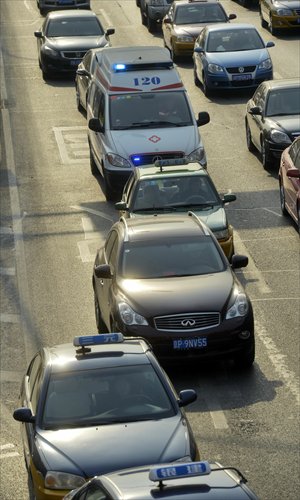Police pledge to unblock city's terminal gridlock

Firefighters and paramedics Monday gave a cautious welcome to a police initiative to improve traffic order to allow emergency vehicles to drive through the city's gridlocked streets unimpeded.
The policy, intended to be introduced by March 2013, follows outcry over the death of a 50-year-old male cyclist who died in an ambulance on his way to hospital on Friday after he was injured in a traffic accident.
"The accident occurred only three kilometers from the hospital, but it took the ambulance 40 minutes to get there," said Li Jianren, media officer from Beijing Emergency Medical Center (BEMC) Monday.
The cyclist was hit by a car in Tian village in Shijingshan district. Paramedics arrived at 6 pm, and transferred to him to the Armed Police General Hospital in Haidian district, but the man died in the ambulance after it got stuck in traffic, the Beijing Evening News reported Sunday.
"The ambulance couldn't reach the hospital in time because the emergency lanes were blocked by other vehicles," said Li.
Among the nine issues the regulation lists as a priority, it will target vehicles that block the emergency lane, queue jumpers or drivers that ignore red lights, as well as pedestrians who jaywalk or jump across guard rails in the middle of roads.
The Municipal Public Security Bureau (PSB) has committed to having more officers on the roads, the Beijing Times reported Monday.
Li told the Global Times that while BEMC approves of any plan to improve response times for their paramedics, it has doubts over whether any new rules could be enforced due to a general lack of traffic officers on the streets.
In general, most road users never give way to ambulances, said Li.
"Especially during the rush hour, drivers refuse to give way at least 50 percent of the time," said Li, alleging that the problem is becoming worse over time.
The increasing number of vehicles on the capital's roads as well as inadequate transport management and city construction are to blame, according to Li.
"Sometimes traffic police will help clear the way in an emergency," said Li.
"Yet even they can't do much when the traffic is bad," he noted.
Zhang Yu, media officer with the Beijing fire department told the Global Times that they would also welcome this new regulation.
"There are cases when fire trucks couldn't reach the fire due to the traffic conditions or not being given way to by other vehicles," she said.
Zhu Tao, a transportation expert from the Beijing University of Technology, said there are too few traffic police officers to ensure the traffic is orderly, let alone find and punish those who do not give way to emergency vehicles.
But pedestrians are also at fault, noted Zhu, as they often cross the road against the red light.
"Pedestrians' behavior affects the traffic and therefore they should be punished as well," he said, noting that driving schools should instruct trainee drivers about how to avoid emergency vehicles.
Zhang Meng, a local car owner who has been driving for a year, said that many car drivers believe that people use ambulances and police cars for their own personal use, instead of just for their work.
"Nobody will believe that they are working if they keep using these special vehicles off-duty," he said.
He is unsure what he is supposed to do when he hears an emergency vehicle approaching, said Zhang.
"I fear that I might crash the car into the ambulance since there were no instructions about [how to give way] at my driving school," he said.
"Other vehicles should give way to police cars, fire trucks, ambulances and breakdown vehicles when they are on duty," is the correct answer to a multiple choice question in the written test for a Chinese driving license regarding what to do when an emergency vehicle approaches.
According to China's Road Traffic Safety Law, drivers of regular vehicles that do not give way to emergency vehicles or who use the emergency lane will be fined 200 yuan ($32).
Beijing PSB could not be reached Monday.